QuestionHello. I hope you can help us. I am the proud owner of a 3 y/o, male, mini-poo - his name is Lewis. I adopted Lewis when he was 7 months old, he was already neutered. Lewis' previous owners were elderly and could not handle his high energy level - they also had another elderly dog who was suffering from arthritis and would nip at Lewis when he attempted to play - Lewis was kept in a kennel even when the couple was home - they could not wait to get rid of him. I have 4 children, and an 8 y/o female cat - Lewis gets a lot of attention & is loved very much. I am a stay-at home mom, so Lewis is rarely home alone. He is taken outside to do his 'business' regularly, and he is walked several times a day. He will let me know when he wants to go out by barking at the door, however, he continues to pee and poop in the house!
About a year and a half ago we moved into a new house, with brand new carpet in three upstairs bedrooms. Lewis pees in all three rooms - I have never caught Lewis in the act of peeing on the carpet, and unfortunately it blends in so well that unless it's stepped in while wet, we don't know it's happened. I am at my wits end trying to prevent this! I have resorted to placing a gate at the bottom of the stairs to keep him out entirely. Poop is another issue. Lewis will spend an entire day outside with us, at the park or other family outings, with plenty of opportunity to poop freely - but he prefers to poop in the house, mostly on the area rug under my dining room table or in the kid's playroom. Again, I've never caught him in the act - no one has. He knows he has done wrong, he cowers and hides when I happen upon the poop. When cleaning up the poop, I take him to it and put his nose up to it, he is told 'that's naughty, no poop in the house' and I do swat him on his rear end - he is then given a 'time out', in the corner, in his bed - the time spent in 'time out' varies, and he will attempt to get up and go back to playing and loving, but he is always redirected and does listen very well. Time out is always followed by being taken outside and reminded of 'no poop in the house'.
Another very troublesome issue with regard to Lewis is his level of attachment, to me in particular. He follows me everywhere, even into the bathroom. He will wait for me outside the door when I'm showering, he will cry if I take too long. Lewis will not play outside in the yard, unless I am outside too. The kids try to distract him with toys, this doesn't work. We've tried ignoring the crying, it can go on for hours, but stops immediately if I walk out. Recently, at a picnic, I walked away to use the ladies room, Lewis cried the entire time I was gone despite my husband holding his leash and our daughter attempting to comfort him. My husband often travels for work, when he is out of town, Lewis does sleep with me - however, my husband does not allow Lewis in our bed, and Lewis knows this. When my husband is home, Lewis doesn't even try to sleep next to me, he sleeps under my side of the bed instead. The recent placement of the gate at the bottom of the stairs had resulted in some very long and sleepless nights. Please tell me what I'm doing wrong! ANY suggestions at all, would be greatly appreciated. I am currently 4 months pregnant with twins and don't know if I can handle Lewis' issues long term. My husband is annoyed, and I am at a point of despair.
AnswerCorrecting problems with an older dog that has bad habits is tough. The gate was a step in the right direction, but hitting him won't work.
When you are around you need to keep a close eye on the dog. Use closed doors or gates to keep it in the same room as you are, and perhaps as I do, a short chain fastened to the computer desk. If you catch it in the act, give it a sharp ''Ah, ah, ah!'' and take it out. When you can't watch it, crate it. When you take him out, make him walk to stimulate elimination. Praise him every time he does anything outside.
It is only natural that a puppy resists its crate at first. What the puppy wants more than anything else is to be others, you, anyone else in the household, and any other pets. In our modern society, even if we are home, other things distract us from the attention an uncrated puppy must have. The only real solution is to crate the dog when you aren't around. The dog may be happier in its den than loose in the house. It relaxes, it feels safe in its den. It rests, the body slows down reducing the need for water and relieving its self. Dogs that have been crated all along do very well. Many of them will rest in their crates even when the door is open. I think the plastic ones give the dog more of a safe, enclosed den feeling. Metal ones can be put in a corner or covered with something the dog can't pull in and chew. Select a crate just big enough for the full grown dog to stretch out in.
Leave it some toys. Perhaps a Kong filled with peanut butter. Don't leave anything in the crate the dog might chew up. It will do fine without even any bedding. You will come home to a safe dog and a house you can enjoy.
A dog that has not been crated since it was little, may take some work. Start out just putting its toys and treats in the crate. Praise it for going in. Feed it in the crate. This is also an easy way to maintain order at feeding time for more than one dog.
The "shut the puppy in a safe room" is a fallacy. Very few houses even have a safe room. How many of us have a room with a hard surfaced floor and nothing else? Most rooms have electrical cords to chew if nothing else. In addition to destroying anything a bored puppy finds to chew, it may choke or have intestinal blockage from the pieces. I had a friend that left her dog in a "safe" room. It ate a hole in the floor covering. The safe rooms fail to give the dog the comfort of the enclosed space their instinct requires. Nor do they restrict activity extending the time the dog can go without relieving itself.

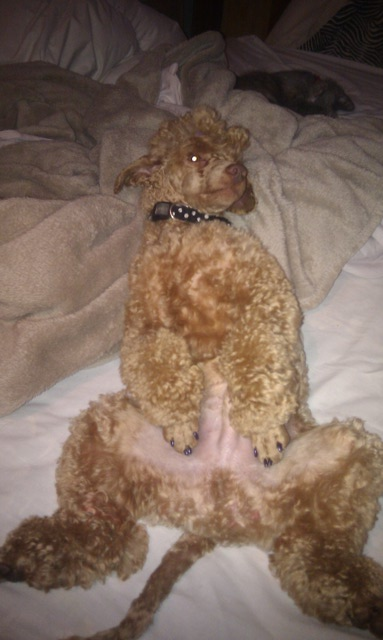 pogo poodle with seperation anxiety
Question
Banner
Hi, I have a 15 month old male d
pogo poodle with seperation anxiety
Question
Banner
Hi, I have a 15 month old male d
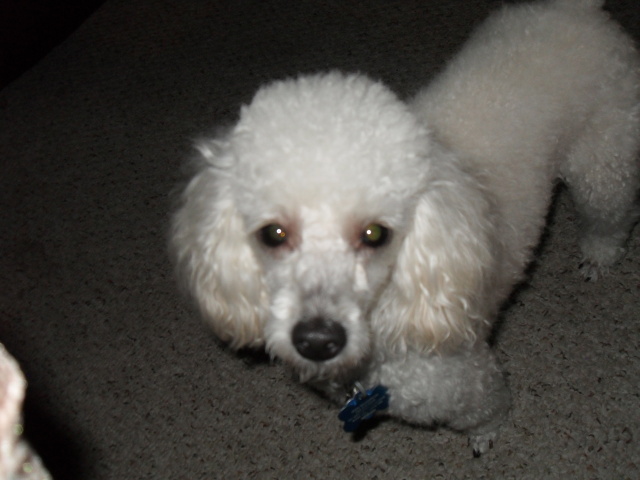 2year old male poodle want to stud
Question
Moseley
I have a white male 2year old reg toy
2year old male poodle want to stud
Question
Moseley
I have a white male 2year old reg toy
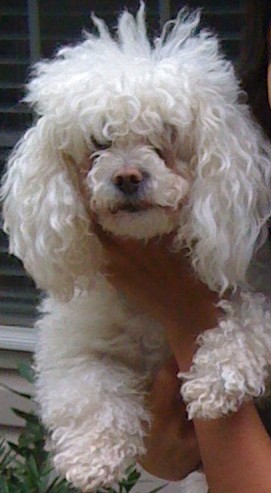 Poodle Depression??
Question
Buubles
Hi, I have a 7 year-old toy poodle. Sh
Poodle Depression??
Question
Buubles
Hi, I have a 7 year-old toy poodle. Sh
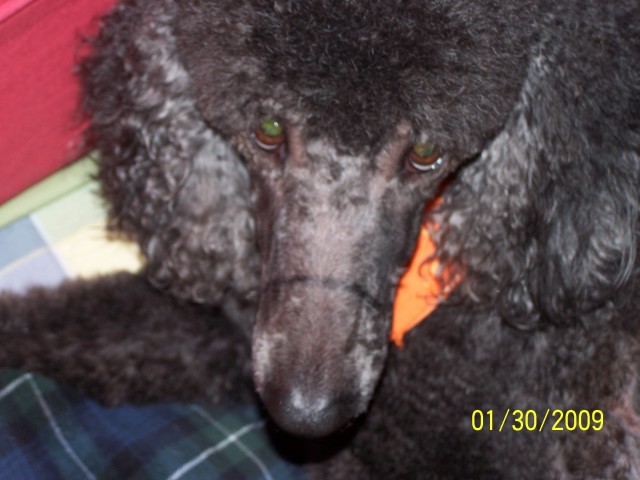 Stripe on nose
QuestionStripe on Perrys nose
QUESTION: Hello Ki
Stripe on nose
QuestionStripe on Perrys nose
QUESTION: Hello Ki
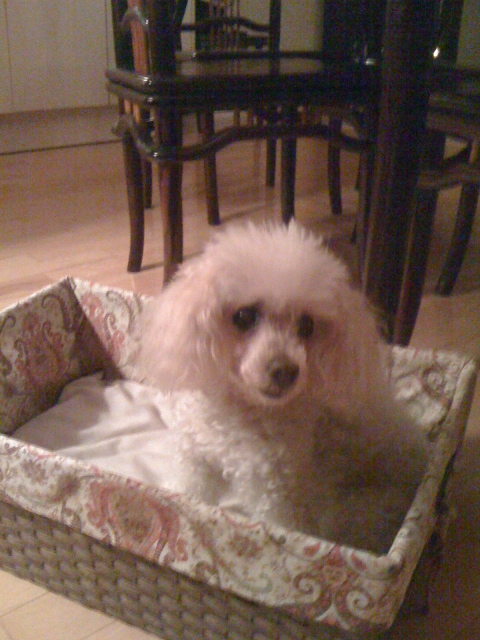 17 yr old Toy poodle rescue
Question
Pax
We resecued a pair of poodles at 1
17 yr old Toy poodle rescue
Question
Pax
We resecued a pair of poodles at 1